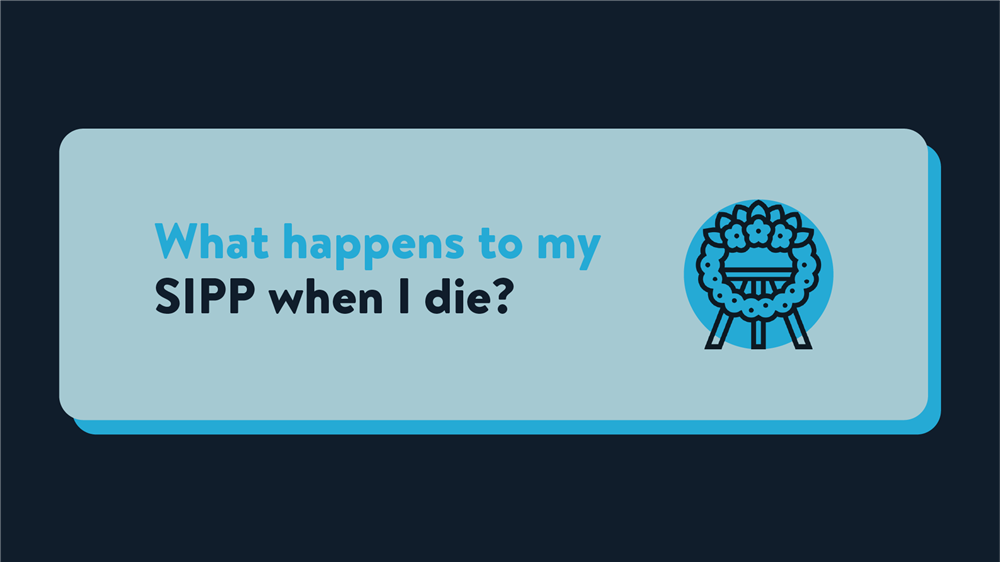Regardless of your age, if you've got a Self-Invested Personal Pension (or SIPP, for short), it's almost inevitable that you've asked yourself the following question at some point: "What happens to my SIPP when I die?"
Even though the question might seem morbid, the answer is (thankfully) a little more upbeat: once you've passed away, your personal pension is passed on — to whoever you want!
And, seeing as any leftover money could make a difference to the lives of your loved ones, it’s important to ask uncomfortable questions like this, right?
So, whether you’re looking to open a SIPP, get your pension pots in order, or prepare a proper plan for retirement, this article will help you explore:
- What happens to my SIPP when I die?
- SIPP inheritance tax
- Inheriting a SIPP
- What happens if a beneficiary dies?
- Summary
What happens to my SIPP when I die?
Any money left in your SIPP when you die – and all other types of personal pensions, for that matter – will usually be given to people you’ve chosen beforehand. (We say usually, because even if you’ve nominated a beneficiary or completed an ‘expression of wish’ form, there could be certain terms within the pension that stipulate rules to align to this — with some providers and trustees even making the final decision.)
These people are known as beneficiaries and, if you do have a SIPP, you’ll want to make sure you’ve named at least one.
With a Wealthify SIPP, for example, you can choose up to eight beneficiaries, using the app or online dashboard to allocate the percentage of money they’ll each receive.
Likewise, you can easily change those percentages, as well as remove or add new beneficiaries whenever you want — perfect if a new family member comes along!
Typically, if you die without officially stating your ‘expression of wishes’, then your pension is likely to be paid out to your dependants or next of kin. If there’s no obvious person or people to send your money to, then the scheme administrators could nominate an individual or entity (such as a charity) to receive these benefits.
What happens to your pension when you die over 75?
Nobody wants to pay more tax than they need to, and one of the advantages of a private pension is the tax advantages once you’ve passed away.
This changes, however, based on whether you die before or after turning 75.
If you die before your 75th birthday, your pension will usually be given to your beneficiaries, tax-free.
They take this money, which will stay tax-free regardless of whether they take it as a lump sum or income.
It’s worth noting that if you die before 75 and it takes more than two years to designate a beneficiary, then this amount will also be taxed. Income tax also applies if the death benefits are paid any later than two years after the date the scheme administrator knew – or should have known – about the death.
After your 75th birthday, handing your pension to your beneficiaries will be subject to tax, whether they take it as an income or lump sum.
If you have no dependants and your entire private pension is being left to a charity, then it won’t be taxed.
SIPP inheritance tax
Following the 2024 Autumn Budget, it’s important to understand that SIPP inheritance tax rules are set to change:
- From April 6th 2027, most unused pension funds and death benefits will be included within the value of a person’s estate for inheritance tax purposes.
As things stand though, your private pension doesn’t form part of your estate, meaning it![]() can still be passed to beneficiaries without them having to pay inheritance tax.
can still be passed to beneficiaries without them having to pay inheritance tax.
However, if you’ve taken a lump sum from your pension and it’s in your bank account, then it would be classed as your estate — and taxed as such.
In April 2015, new SIPP inheritance tax rules were introduced that reduced the tax liability for any lump sums paid to a beneficiary. This means if you die after 75, beneficiaries will only pay tax on your pension benefits at their rate of income tax.
Inheriting a SIPP
If you're the beneficiary inheriting a SIPP, you can choose to receive it in the following three ways:
- As a lump sum
- Leave it in the SIPP to be invested
- Draw an income from it
What’s more, there are no restrictions on how often a pension fund can be passed on, as long as there are still funds available.
What happens if a beneficiary dies?
In a nutshell, the same process is followed as when you – the original Plan holder – dies.
So, when a beneficiary passes away, any remaining money will go to their nominated beneficiary (or beneficiaries).
This can happen from beneficiary to beneficiary until the value of your pension is gone, or until a beneficiary takes the whole amount as a lump sum.
How to name a beneficiary
At Wealthify, we make it really easy to set up a beneficiary. You can do this yourself at any time and name up to 8 people with different percentages attributed to them.
Simply log into your account, head to your pension, and choose the option for ‘Beneficiary’. You can add, edit, and delete beneficiaries at any time from within our app or online dashboard.
Summary
As ever, we hope you found this article helpful, and that you now feel more confident in answering “what happens to my pension when I die?”. To summarise:
- Any money left in a private pension will be given to your pre-chosen beneficiaries.
- The money can be passed from beneficiary to beneficiary until it’s gone.
- If you die before your 75th birthday, your pension will be given to your beneficiaries, tax-free; any time after, it’ll be subject to tax.
- If it’s being left to a charity, it won’t be taxed.
- Your private pension doesn’t currently form part of your estate, meaning beneficiaries don’t have to pay inheritance tax. This is set to change from April 6th 2027.
In the meantime, if you’re looking to open or transfer to a Wealthify SIPP, you can learn more about what we have to offer by clicking the link.
With investing, your capital is at risk. Please remember the value of your investments can go down as well as up, and you could get back less than invested.
Wealthify does not provide financial advice. Please seek financial advice if you are unsure about investing.
Your tax treatment will depend on your individual circumstances, and it may be subject to change in the future.



